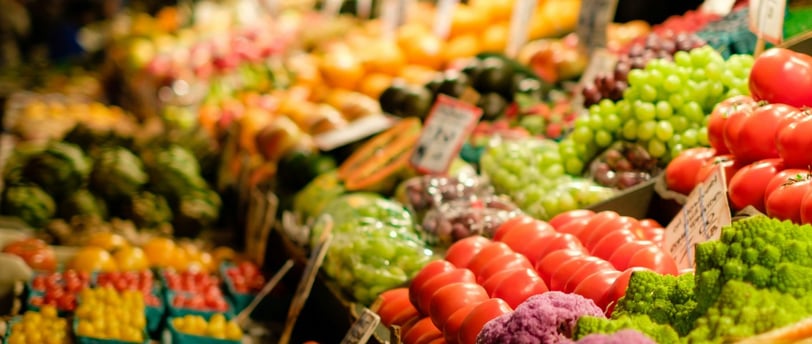

Adopting Sustainable Food Systems in Daily Life
Sustainable food systems are crucial for environmental health, social equity, and economic stability. Here's how individuals can contribute to more sustainable food practices in their everyday lives:
Choose Local and Seasonal Produce
Opting for locally grown, seasonal produce supports regional farmers and reduces the carbon footprint associated with long-distance transportation:
Shop at farmers' markets or join a community-supported agriculture (CSA) program
Learn about seasonal produce in your area and plan meals accordingly
Grow your own fruits, vegetables, and herbs, even in small spaces like windowsills or balconies
By choosing local and seasonal foods, you can reduce food miles by up to 1,500 miles per meal.
Reduce Food Waste
Minimizing food waste is essential for sustainability:
Plan meals and shop with a list to avoid overbuying
Store food properly to extend its freshness
Use leftovers creatively in new recipes
Compost food scraps when possible
Roughly one-third of all food produced is wasted annually. By being mindful of consumption and finding creative ways to use leftovers, we can significantly decrease this waste.
Embrace Plant-Based Meals
Incorporating more plant-based options into your diet helps mitigate environmental strain:
Start with "Meatless Mondays" and gradually increase plant-based meals
Experiment with plant-based proteins like legumes, tofu, and tempeh
Try new recipes that showcase vegetables as the main ingredient
Plant-based meals reduce greenhouse gas emissions and land use associated with animal agriculture.
Choose Sustainable Protein Sources
When consuming animal products, opt for sustainable choices:
Select sustainably sourced seafood (look for MSC or ASC certifications)
Choose grass-fed, free-range, or organic meats when possible
Incorporate more plant-based proteins into your diet
Minimize Processed Foods
Processed foods often have a higher environmental impact:
Avoid sugary snacks, processed meats, and packaged convenience meals
Choose whole foods like fruits, vegetables, whole grains, and legumes
Prepare meals from scratch using fresh ingredients
Support Sustainable Brands and Practices
Make informed choices about the products you buy:
Research and support companies with strong sustainability commitments
Look for eco-friendly certifications on products
Choose products with minimal packaging or recyclable packaging
Reduce Packaging Waste
Minimize the environmental impact of food packaging:
Bring reusable bags, containers, and water bottles when shopping or dining out
Buy in bulk to reduce packaging waste
Choose products with minimal or recyclable packaging
Educate Yourself and Others
Stay informed about sustainable food practices:
Learn about the environmental impact of different foods
Share knowledge with friends and family
Support local initiatives working on food waste prevention and sustainable agriculture
Practice Mindful Consumption
Be conscious of your eating habits:
Eat slowly and mindfully to avoid overconsumption
Listen to your body's hunger and fullness cues
Appreciate the origins and journey of your food
Advocate for Sustainable Food Policies
Use your voice to support sustainable food systems:
Engage with local policymakers on food-related issues
Support policies that promote sustainable agriculture and food distribution
Participate in community initiatives focused on food sustainability
By incorporating these practices into daily life, individuals can play a significant role in promoting sustainable food systems. Remember, small changes can lead to substantial impacts when adopted collectively. Start with a few manageable adjustments and gradually expand your sustainable food practices over time.


Sustainable Living Made Easy
Empowering you to live a greener life
How this site works
Mission and Transparency: We are committed to providing valuable resources, guides, tips, tools, and techniques to help you lead a more eco-friendly lifestyle. However, it’s important to understand both our strengths and limitations:
Information Accuracy: We strive to deliver accurate and reliable information, but we cannot guarantee perfection. Users engage with our content at their own risk; we do not accept liability for any issues that may arise.
Sustainability Guidance: The information provided here is not professional advice and we encourage you to conduct your own research to ensure that the practices and recommendations align with your specific circumstances.
Company Evaluations: We do not typically assess the customer service or financial stability of the companies mentioned. Please be aware that any company can face challenges, which may not be publicly disclosed until it’s too late.
External Links: We often link to other websites for additional resources. We cannot be held responsible for the content found on these external sites, so please use your discretion.
Product Information: While we aim to provide accurate product information at the time of publication, prices and terms including where companies deliver can change at any time. Always double-check current details before making any purchases or commitments.
Affiliate links: This website contains affiliate links, which means that if you click on a link and make a purchase, we may earn a small commission at no additional cost to you. We only recommend products and services that we believe will add value to our readers. Thank you for supporting our efforts!
Please read the Full Terms & Conditions and Privacy Policy
Thank you for being part of our sustainable living community! Together, we can make a positive impact on our planet.
contact@sustainableliving,adeeasy.com
Trading NIF:: 309276039: Faro, Portugal © 2025. All rights reserved
